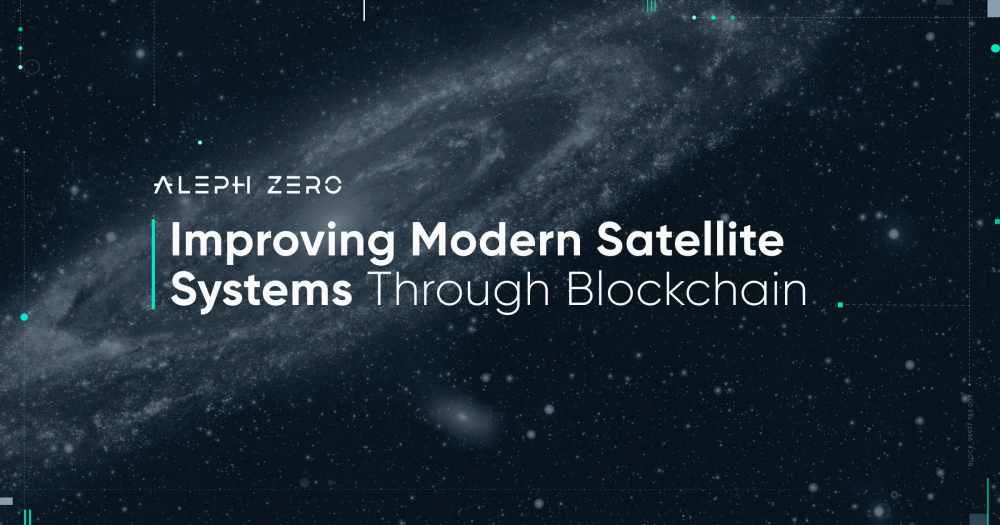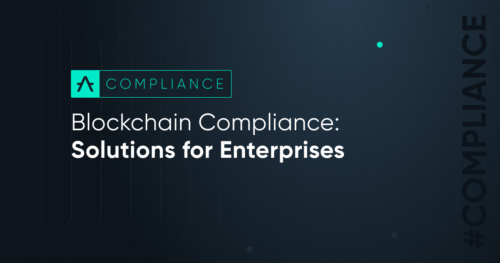Improving Modern Satellite Systems Through Blockchain
Oct 5, 2022

The intersection of blockchain and space exploration is a world of hypotheticals that demands we perceive the benefits of this partnership occurring years from now. Fortunately, a more tangible set of goals is within reach as we explore the connection between satellite systems and blockchain.
Before humanity heads into deep space and begins enacting the dreams of futurists and science-fiction writers, we must first explore the possibilities offered to humankind found in Earth’s orbit. The last 70 years have been a period during which satellites have revolutionized the way we communicate with each other, becoming a pillar upon which our perpetually connected world stands. The private aerospace sector is growing at an impressive pace, on course to become a trillion-dollar industry by 2040, with satellites-as-a-service to be a significant portion of this sector.
What Is Satellite-As-A-Service?
Satellite-as-a-service is a dynamically growing concept that allows companies to take advantage of the growing web of satellites already orbiting Earth without having to launch their own fleet of satellites into orbit to provide the connectivity they need. This subscription model allows for greater flexibility and helps cut costs, as launching one’s own custom satellite fleet is still financially unviable for most businesses. Some of the advantages of this model include:
- Businesses can choose their required bandwidth and coverage depending on market demands;
- Lack of ownership risk;
- No further technological investment is required due to this feature being outsourced to the satellite provider.
These benefits make satellite-as-a-service a convincing choice for network operators the world over as they outsource this demanding field to third parties. The amount of data being transferred between satellites and terrestrial entities is an area where blockchain technology’s secure nature can prove useful to ensure the private nature of sensitive information, as well as the data’s integrity.

Leveraging Blockchain to Create Agnostic Networks
One of the more immediate use cases for blockchain technology in the context of satellite communication involves the untethering of information from terrestrial influence. Conducting transactions on Earth’s orbit is a security feature in itself as it reduces human influence even further. When combined with the immutable nature of blockchain technology and the self-executing properties of smart contracts, we are entering an era of highly secure transactions that are sovereignty agnostic. One of the key features that contribute to this sense of security involves blockchain technology creating a chain of data custody that broadcasts to all interested parties the current state of any piece of information and its history.
Cloud Constellation and IBM’s Space Tech are two such companies that are hoping to create a novel cloud storage system whose backbone will be satellites taking advantage of the security features that make blockchain such a compelling alternative to this challenging endeavor.
Mapping Satellite Positions With Blockchain
As more and more satellites begin inhabiting Earth’s orbit, it’s becoming an increasing challenge to navigate the cluttered space surrounding our planet. A solution to this problem is the creation of systems that will show the current position of each individual satellite. A pioneer in this field is a project spearheaded by ConsenSys Space called TruSat, which is an open-source, globally-accessible record of satellite orbital positions. The open-source nature of the project ensures that the entire space-faring community can participate in creating a safer environment for all who venture outside of Earth’s atmosphere.
This database is designed to take advantage of the secure and immutable nature of distributed ledger technology, leveraging the Ethereum blockchain to ensure that the data stored in this public database remains safe from tampering and resistant to erroneous inputs.
Building a Data Cloud Above the Clouds
Another promising area in which blockchain technology can flourish above our heads is when designing the future of cloud storage. Pioneers in this field include Cloud Constellation and their partners IBM and LeoStella, which aim to create something they call the SpaceBelt. The project intends to create a satellite network supplying data storage and edge computing services.
Edge computing is a method that permits information to be processed by the very computers that first received it rather than necessitating the data to be sent to a central server for cataloging and analysis. If we wish to venture further into space, such solutions will become a necessity due to the sluggish nature of communication over the vast distances found in the cosmos. For example, it takes 24 minutes for a radio wave to travel between Mars and Earth. Simple two-way communication will become increasingly difficult the further we travel. Edge computing is seen as a way out, allowing research teams that are far from Earth to maintain independence throughout their missions.
Due to the fact that many of the cloud and edge computing projects that are being designed involve numerous satellites that work in swarms to collect, analyze, and store data, a use case for blockchain technology materializes as we begin to notice the need for state of the art security to handle the sensitive information. This is why the startup LEOcloud intends to use blockchain solutions to secure their edge computing services located at ground stations as well as the orbiting data centers that will be connected to them. Through the use of low-orbit satellite clusters, we can make a step forward in providing digital monetary services in regions of the world that don’t have access to traditional infrastructure solutions. Through the use of blockchain, these channels of communication can remain secure and immutable and create the foundation for new economic activity.

Blockchain to Play a Part in the New Space Economy
We are excited by the brewing potential found at the intersection of modern space exploration and distributed ledger technology. There is considerable room for innovation which will result in creating new markets and sources of economic revenue that a decade ago were still in the realm of science fiction. Most importantly, though, the new space race we are observing will most surely propel human ingenuity to new heights. Security will always be in demand, and blockchain technology has been diligently spearheading this field. We expect an increase in use cases involving the blockchain and aerospace industry in the near future and are full of hope that Aleph Zero will be making its mark there as well.


